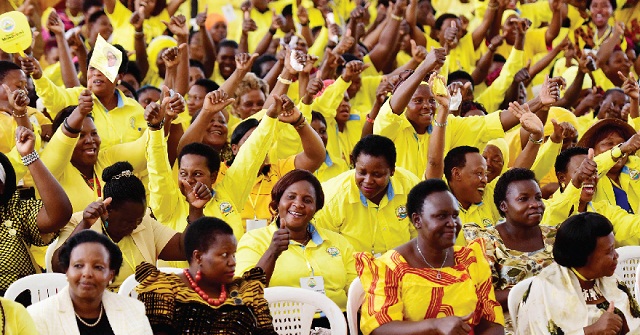
Ruling party’s unrivalled growth scrutinized as it marks 32 years in power
Kampala, Uganda | IAN KATUSIIME | In 2006, after the first election since the country adopted the multiparty system of government in 2005, the ruling National Resistance Movement (NRM) had 205 MPs, after the 2011 elections that shot to 263 and after the latest 2016 polls, that number hit 294. By contrast, the number of MPs from the biggest opposition party, the Forum for Democratic Change (FDC) has remained almost static. After the 2006 election, the party had 37 MPs, after 2011 it had 34 legislators, and after 2016 it has 36 MPs. The small parties have shrunk even farther. Only the Independents; MPs without party affiliation, have grown to 66 – most of whom are sympathetic to and vote with the ruling party.
In the last ten years, the government created a number of new districts, increasing the number of constituencies at parliament, LC5, and LC3 levels. And the NRM dominated most of the elective positions. As a result of this dominance, the NRM celebrates 32 years since it captured power on January 26, 1986. A debate is raging about whether the party has grown too big to be good for Uganda. Richard Todwong, the Deputy Secretary General of NRM, is not among those wishing the party was smaller and opposition a little bigger to create a semblance of democratic competition. He says the party’s big numbers are proof of NRM’s invincibility and is happy that the growing trend is unlikely to be reversed soon. ”This country has 40 million people of whom 16.5 million are registered voters. Of those 16 million, 13 million are NRM voters. So we have three quarters of the national register,” Todwong brags. He adds, “We have flag bearers in all positions and we are just waiting for the LC 1 elections date to be clarified and we field our candidates.”
Todwong says 75% of the LC members at LC 3 and LC5 level are NRM in addition to the 13million voters who he says are NRM supporters on the national register, and he also makes mention of the party’s vast majority in parliament. “Let us just look at the recent by election in Ruhaama county (Ntungamo district), the opposition did not field a single candidate, so an NRM candidate was running against an NRM leaning independent in the race,” Todwong told The Independent. During the 2016 general elections, NRM had 289 candidates in the available 290 constituencies while FDC managed only 201. At the district level, NRM fielded candidates for all the 112 districts for the woman MP position while FDC had 61 candidates. Of the 66 Independent MPs, 44 are allied to the NRM while only 2 have an association with FDC. President Museveni has also not rested on his laurels when it comes to boosting NRM’s strength. He hits the stump regularly for NRM candidates in by-elections including those vying for the district chairpersonship. But has NRM’s majority helped the party to improve governance?
NRM caucus overshadows parliament
Thanks to numbers, the NRM caucus has now been turned into a de facto parliament. On a number of occasions, the NRM caucus sitting at either State House Entebbe or at the National Leadership Institute (NALI) in Kyankwanzi district passes resolutions that in turn are passed by parliament. For instance, NRM selected its six candidates for East African Legislative Assembly (EALA) which is based in Arusha at a caucus gathering at State House Entebbe. The proposal extending the parliamentary term from five to seven years was adopted at an NRM caucus meeting. Other controversial amendments have been passed after the NRM invoked its strength. In December 2012, NRM used its majority to pass an oil law with a contentious clause that empowered the line minister to grant and revoke licences, negotiate and endorse petroleum agreements. The law was passed despite criticism that it concentrates so much executive power in the minister, making the individual susceptible to bribery considering the amount of finances involved in oil transactions. Dr. Livingstone Sewanyana, the Executive Director Foundation for Human
 The Independent Uganda: You get the Truth we Pay the Price
The Independent Uganda: You get the Truth we Pay the Price



